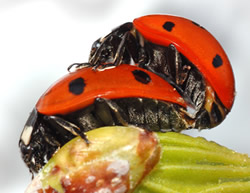When I was in college, majoring in math education, I learned that math is the language of science. In fact, we called it the Queen of the Sciences. (You’d better believe that gave me a sense of superiority over the chemistry and physics majors!) And yeah, I think that the math I was doing then–calculus, differential equations, statistics and even abstract algebra–is mostly useful for describing some kind of science. [pullquote]We too often think of mathematics as rules rather than as questions. This is like thinking of stories as grammar. — Rick Ackerly[/pullquote]
In some ways, everyday math is also the language of science. Home cooks use ratios to ensure that their roux thickens a gumbo just right. With proportions, gardeners can fertilize their vegetable beds without burning the leaves from their pepper plants. And a cyclist might employ a bit of math to find her rate or the distance she’s biked.
But I think too often we adults get caught up in the nitty gritty of basic math and lose the big picture. This is when many of us start to worry about doing things exactly right–and when math feels more like a foreign language, rather than a useful tool.
Earlier this week, I read a blog post from Rick Ackerly, who writes The Genius in Children, a blog about the “delights, mysteries and challenges of educating our children.” In Why Mathematics is a Foreign Language in America and What to Do about It, he writes:
Why do Americans do so badly in mathematics? Because mathematics is a foreign language in America. The vast majority of children grow up in a number-poor environment. We’ve forgotten that the language of mathematics is founded in curiosity. We too often think of mathematics as rules rather than as questions. This is like thinking of stories as grammar. Being curious together can be a really special part of the relationship in families.
And I couldn’t agree more. For all of you parents and teachers out there: how many questions do your kids ask in one day? 10? 20? 100? 1,000? As Ackerly points out, especially younger children are insatiably curious. They want to know why the sky is blue and what makes our feet stink and how come that ladybug is on top of the other ladybug.
A full 90% of the time, we can’t answer their questions. Or maybe we just don’t want to yet. (“That ladybug is giving the other one a ride.”) With Google‘s help, we can find lots of answers. But how often are we asked a math-related question–by a kid or a grownup–and freeze?
For whatever reason, many people are afraid to be curious about math. Or they’ve had that curiosity beaten out of them. I think that’s because don’t want to be wrong. As fellow writer, Jennifer Lawler said to me the other day:
It’s funny because when I make a mistake in writing—a typo, etc.—I let myself off the hook (“Happens to everyone! Next time I’ll remember to pay more attention.”) But if I misadd a row of numbers I’m all “OMG, I’m such an idiot, and everyone knows I’m such an idiot, I can’t believe they gave me a college degree, and why do I even try without my calculator?”
The same goes for answering our kids’–or our own–calls of curiosity.
So what if we decided not to shut down those questions? What if it was okay to make some mistakes? What if we told our kids or ourselves, “I don’t know–let’s find out!” This could be a really scary prospect for some of us, but I invite you to try.
What’s keeping you from being curious about everyday math? What do you you think you can do to change that? Or do you think it doesn’t matter one way or the other? Share your ideas in in a comment.
